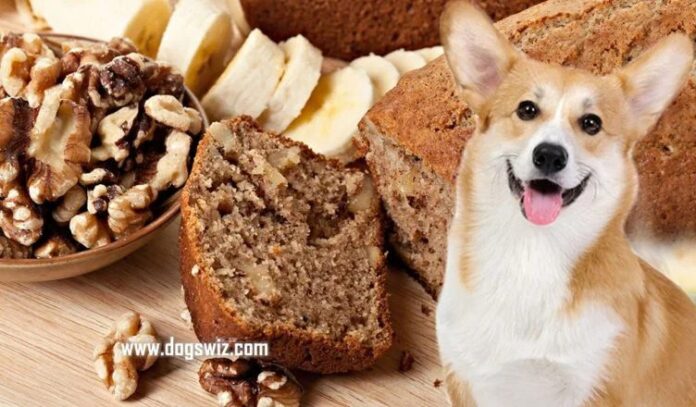Hey there, fellow dog parents! Ever caught your furry friend giving you those irresistible puppy eyes while you’re enjoying a slice of homemade banana bread? I totally get it – been there! Today, let’s talk about whether it’s safe to share your banana bread (especially the kind with walnuts) with your four-legged bestie.
The Quick Answer (For Those in a Hurry!)
TL;DR: While plain banana bread might be okay in small amounts, banana bread with walnuts is a big no-no for dogs. Walnuts can be toxic to dogs and cause serious health issues. Keep that nutty treat to yourself!
Breaking Down the Components
1. The Banana Part
- Plain bananas are actually pretty good for dogs
- They’re packed with:
- Potassium
- Vitamin B6
- Vitamin C
- Fiber
- BUT… banana bread isn’t just bananas!
2. The Bread Part
Regular banana bread usually contains – Sugar (lots of it!)- Butter or oil- Eggs- Flour- Milk- Various additives
These ingredients aren’t toxic, but they’re not exactly healthy for your pup either!
Why Walnuts Are a Deal-Breaker ⚠️
Here’s where things get serious, fam. Walnuts in banana bread are problematic for several reasons
-
Toxicity Risk
- Walnuts can harbor toxic mold
- The mold produces something called mycotoxins
- These can cause tremors and seizures in dogs
-
Choking Hazard
- Nuts are hard for dogs to chew properly
- Can get stuck in throat or digestive tract
- Especially dangerous for small dogs
-
High Fat Content
- Can trigger pancreatitis
- Might cause stomach upset
- Could lead to obesity if eaten regularly
What to Do If Your Dog Ate Banana Bread with Walnuts
Okay, so your sneaky pupper managed to grab a bite? Don’t panic! Here’s what you should do:
-
Assess the Amount
- How much did they eat?
- Was it just a crumb or a whole slice?
-
Watch for These Symptoms:
- Vomiting
- Diarrhea
- Lethargy
- Tremors
- Loss of coordination
- Excessive drooling
-
Contact Your Vet If:
- Your dog ate a large amount
- Shows any concerning symptoms
- Has a history of sensitive stomach
- Is a small breed
Safer Alternatives for Your Pup
Instead of sharing your banana bread, try these dog-friendly treats:
-
Fresh Banana Slices
- Natural and healthy
- Easy to digest
- Perfect training treats
-
Dog-Specific Banana Treats
- Available at pet stores
- Made with dog-safe ingredients
- Properly portioned
-
Homemade Dog-Safe Banana TreatsRecipe idea:
- Mashed banana
- Plain oats
- Small amount of peanut butter (xylitol-free!)
- Mix and bake into small cookies
The Bottom Line: Keep It Safe!
Look, I know it’s super tempting to share everything with our fur babies. They’re family, after all! But some human foods just ain’t worth the risk. When it comes to banana bread with walnuts, it’s better to be safe than sorry.
FAQs About Dogs and Banana Bread
Q: Can dogs eat plain banana bread?A: While not toxic, it’s not recommended due to high sugar content. Small amounts occasionally probably won’t hurt, but it’s not ideal.
Q: What if my banana bread only has a few walnuts?A: Even a small amount of walnuts can be dangerous. Better avoid it completely!
Q: My dog seems fine after eating banana bread with walnuts, should I still worry?A: Keep monitoring them for 24-48 hours. Some symptoms might take time to show up.
Pro Tips for Dog Parents
- Keep baked goods out of reach
- Train your dog not to beg for human food
- Have healthy dog treats ready as alternatives
- Know your vet’s emergency contact info
- When in doubt, always err on the side of caution
Remember, every dog is different, and what might be fine for one could be dangerous for another. Your best bet? Stick to food made specifically for dogs and save the banana bread for yourself!
Stay pawsome, and keep those tails wagging!
Disclaimer: This article is for informational purposes only and isn’t meant to replace professional veterinary advice. When in doubt, always consult your vet!












